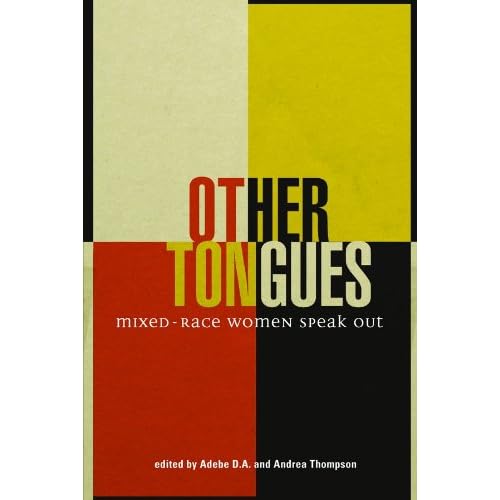Question of the Day: What is mixed race feminism? Good question given mixed race and gender issues aren't often brought in conversation together even with the academic use of intersectionality theory.
Let's start with some basic terminology. I define feminism as a critique on male power with efforts to change it. In essence, for me, feminism is both a theory and a form of activism. This means that feminism is for everyday folks; not just folks with degrees or lots of titles. Unfortunately, over the years, feminism has become a negatively charged term in which people often have a visceral reaction of nodding heads in support or shaking their heads in disgust. These polar opposite reactions often come from a general misunderstanding of what feminism is and what feminists hope to achieve. In her book, Feminism for Everybody, feminist theorist and cultural critic bell hooks talks about the ways in which people are eager to hear about her analysis of movies and other forms of popular culture, "But feminist theory - that is where the questions stop. Instead I tend to hear all about the evil of feminism and the bad feminists: how "they" hate men; how "they" want to go against god; how "they" are all lesbians; and how "they" are taking all the jobs and making the world hard for white men, who do not stand a chance" (hooks, p.vii, 2000). In my teaching in women and gender studies, I am constantly attempting to educate my students on what feminism actually means beyond salacious headlines from Fox News and the Rush Limbaugh crowds. Feminism means being observant and critical of the way in which power is manifested, concentrated in the hands of a few and used against those deemed minority or "other". But feminism also means being active in community uplift, fighting for social justice and using one's voice to combat sexism and other forms of oppression.
I view one's claim of being mixed race as a personal choice at self-definition; not simply a matter of DNA. I object to "one-droppist" logic in which a person with any non-white ancestry can not claim to be of Caucasian/European descent. I find it totally illogical that people of color (anyone who is non-white) often play the role of "one-drop" police when the policy and practice of "one-dropping" originated while African Americans were still enslaved and continued through the period of Jim Crow segregation. Why would oppressed people use the oppressors terminology to limit our self-definition is beyond me. I also object to the relative silence from the mixed race community (most prominently found via online forums) in calling out white racism which often forbids mixed race persons from claiming their white ancestry. It is like whiteness is reserved for only "pure bloods" or "mono-racial" white people. Many mixed race people I have encountered say nothing about their experiences with racism from their "white side" but can give you time, date, place and even weather reports when they experience discrimination from non-whites. I am black AND Filipina AND white. I am not one or the other simply because the average American can't deal with multiplicity. I belong to all of those groups and I have experienced acceptance and rejection from each group. Some more so than others (in the rejection department).
Thus, my mixed race feminism considers all of these gender and racial contours. The confusion and complexity, the diversity and denial, the multiplicity and the misunderstandings. In essence, I see mixed race feminism as a simultaneous critique of gendered and racialized standards of being and behaving with efforts to dismantle gender and racial scripts that limit our range of expression, our life chances and our ability to live free of "boxes" which says we must be "either/or" instead of more fully as "both/and". I am mixed race AND black; feminist AND Filipina; white AND multicultural.
In my view, mixed race feminism challenges essentialism as well. Originating out of philosophy, essentialism is the idea that certain entities must have or share a similar set of attributes to be recognized as belonging to that entity. So for example, to be Mexican, one must speak Spanish. Are you not Mexican if you don't? Mixed race feminism challenges essentialism by accepting the diverse ways in which men and women experience gender and gender discrimination while also challenging essentialist notions of race and culture that says you must choose one race even as you may feel uncomfortable taking sides against an important part of who you are.
My mixed race feminism goes beyond theory as well. I am active in several mixed race online communities (mostly scholarly or social issue based), work in women's volunteer organizations which have been historically predominantly black or formerly all-white and some that are multi-racial. I work closely and have even published research with colleagues in Asian American Studies about our experiences with race, class and gender growing up in Compton. I live mixed race feminism as an academic, an activist and as a human being. Thus, mixed race feminism is both theory and practice....a way to challenge our limited conventions in how we view, discuss and deal with gender and race.


Emily is committed to racial equity everywhere and is masterfully using her documentary film productions to influence the conversation about race in this country and abroad. I know you'll agree her message is timely and "must see" viewing for us all.
ReplyDeleteFuture Children 5 Minute Film: www.tinyurl.com/MicroRacism
NBC4 Interview: www.tinyurl.com/FutureChildrenNBC4